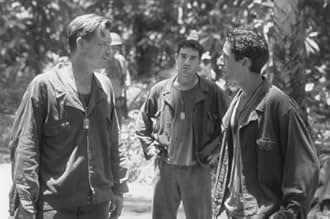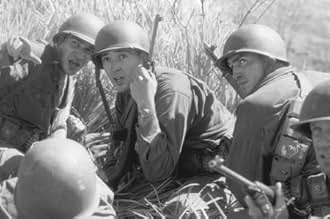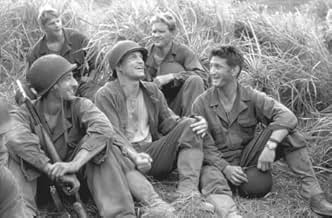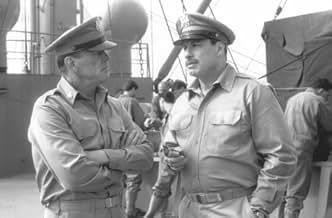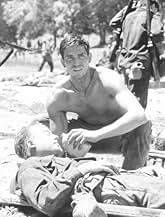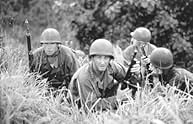Liberamente ispirato al romanzo autobiographico di James Jones, ambientato alla battaglia di Guadalcanal durante la seconda guerra mondiale.Liberamente ispirato al romanzo autobiographico di James Jones, ambientato alla battaglia di Guadalcanal durante la seconda guerra mondiale.Liberamente ispirato al romanzo autobiographico di James Jones, ambientato alla battaglia di Guadalcanal durante la seconda guerra mondiale.
- Candidato a 7 Oscar
- 23 vittorie e 47 candidature totali
- Witt's Mother
- (as Penny Allen)
- Melanesian Villager
- (as Benjamin)
Recensioni in evidenza
Saving Private Ryan was significant in that it visually depicted war in a realistic, gritty way. The Thin Red Line's focus is more philosophical. It is about the contradiction between the beauty of nature and the destructive nature of men. The movie cuts continuously between the external struggle of American GIs fighting to take a crucial hill from Japanese occupation on Guadalcanal - and more importantly, the internal chaos of war as every man tries to come to his own terms about matters such as morals, death, God, and love.
Unlike in Saving Private Ryan, there is nothing patriotic about this movie. In fact, there probably has never been a more anti-war film. The fighting men here are disillusioned, lost, and frightened. They don't fight for their country or "democracy" - they fight because they have to. The only priorities are survival, and - for the more humane - caring for their comrades. Renowned composer Hans Zimmer - who won an Oscar nomination for his work-captures the grim mood perfectly and allows us to hear the men's thoughts.
The characters are portrayed by a strong ensemble cast. Acting is uniformly excellent, especially Nick Nolte as Colonel Tall, who is the unfeeling commander of the ground offensive on Guadalcanal. Thoroughly unlikable, he is the closest thing to a villain in the movie. After studying war for an untold number of years, Tall sees Guadalcanal as his chance to prove himself and move up in the ranks - the men are only a tool to accomplish this goal and expendable. In one crucial scene, he orders a captain (played by Elias Koteas, in another outstanding role) to lead his men to a frontal assault against a Japanese controlled hill. When the captain suggests a more logical alternative, the colonel screams: "You are not gonna take your men around in the jungle to avoid a goddamn fight!" To this, the captain replies, `I've lived with these men, sir, for two and a half years and I will not order them all to their deaths.' Later, when the hill is taken, he is dismissed of his duties as Tall sees him as a threat to the successful achievement of his goal. Certainly, not every commander must have been that coldhearted and selfish, but surely some were, though not necessarily to that extreme.
While the acting is very good, much of the cast is relatively unknown and it can initially be hard to distinguish the characters from each other as they may appear to be very similar. They are all about the same age, have dirt smeared over their faces, and wear helmets and the same military garb. Also, the stars in this movie have very small roles. George Clooney and John Travolta are credited with starring roles while really little more than extras - clearly for marketing purposes. You will not see more than two minutes of each.
One of the main themes of the movie is the contrast between nature and men's destructiveness in war. The director, Terrence Malick, hired cinematographer John Toll to capture this on camera, and towards achieving that goal they couldn't have been more successful. The almost surreal scenery is nothing short of stunning and has the same visual impact as any special effect. The beauty of nature is always present, even when it is a setting for battle of destruction, and death.
Though the battle scenes fall short of the frightening realism in Saving Private Ryan, they are heads and soldiers above every previous attempt. One truly gets the sense that war is a chaotic, often hopeless environment where it is only a matter of luck whether you survive or get killed.
`How did we lose the good that was given us? Or let it slip away? Scatter it carelessly ... trade it for what has no worth?' The film is filled with such poetic questions as to which there are no real answers. This is definitely not a party movie. There isn't anything uplifting about it - it is downright depressing. Asides from entertainment value, however, this is a film that makes you think.
Terrence Malick's films are not everyone's cup of tea, and this is not only not the exception, but probably the most extreme example of that at display: There are many qualities from this movie that are frankly admirable (Particularly its brilliant cinematography and performances) but it is also the kind of movie that is quite tedious to watch at moments.
And it's already a pretty long film, it feels even longer than it actually is.
If you are about to watch this, don't expect something like "Saving Private Ryan". Expect something more akin to Apocalypse Now Redux: A brilliant, but also tedious movie that is both beautiful and both tiring at moments.
The company is not made up of conscripts but regular soldiers. Some of them have been in the Army more than 10 years. Some of them however have never seen real action before and this is a hot and uncomfortable location, despite the lovely tropical scenery. Some crack up, some die, some do heroic deeds. Their leaders are not particularly admirable; one is quite happy to get his men killed if he can come out of the action looking good.
Out of sight for most of the film are the Melanesian inhabitants, the Solomon Islanders, who are carrying on living as best they can while the war rages around them. Their serenity is in sharp contrast to the frenetic military activity. Of course, there is nowhere for them to go.
There is some action excitingly filmed but as in real wars much of the time is spent preparing and waiting. Personal stories unfold but at the end it is survival that matters.
The lighting and photography is quite superb, the lighting in particular fitting the mood perfectly. Filming was not actually on Guadalcanal but near Port Douglas in Northern Queensland where there is similar tropical rainforest and fauna but with much easier logistics. It took ages apparently but seems more than worth the effort.
This is probably one of the four or five greatest war films ever made, right up there with "All Quiet on the Western Front, " "Paths of Glory," "Bridge on the River Kwai" and "The Longest Day." Never has a movie better portrayed what it's like to be a frontline soldier.
Terrence Malick has the reputation of being an eccentric, difficult director - Kubrick without the fear of flying. Yet this is not a particularly unconventional movie - it's just that everything hangs together - the story, dialogue, performances, photography and settings. On thing is clear - this is a better interpretation of James Jones' novel than the 1964 version.
Malick came in with this pack, concerned with newly emerging ideas about meaning and language. The philosophy establishment was forming a new split (US and Continentals) largely characterized by how to reinvent Wittgenstein's insights but with a more friendly rationale. Chomsky was shaking one world, formal abstraction for computers another. Exciting --- moreso than today. But Malick was not a verbal communicator, nor a logician, nor an academic (all sides of the same thing). So he dove into practical visual semiotics.
He is not a brilliant man, merely a journalist. But he does seem to be particularly honest and understands some damned good, solid, human ideas compared to other filmmakers. One can really see this early MIT exposure in 'Red Line.'
We can thankfully forget plot -- there is not meant to be any story. In fact, the war is only used here as a canvas of motion, abstractions of 'regular' life, colliding and sometimes adhering to souls, sometimes destroying them. The device is to build the film around the sounds: narrative voiceovers (current and remembered), natural sounds, haunting music. The images are attached to the sounds, which are derived from abstractions. This is exactly the reverse of Spielberg, which is why there cannot be any comparison to 'Private Ryan,' or any other film that is 'about' something. It is why Malick can never 'explain' his films.
The execution is hypnotic. I wonder what the six-hour version is like. The editing (and particularly of the sound) is unusual, so transports us beyond the strangeness of tropics, war, history. That editing is much like Van Morrison's music: it establishes the rhythm only as a reference to dance around, peeking in and out. The relationship of the rhythm within the shots to the rhythm of the shots is very bluesy.
Having no story opens new possibilities and creates unfamiliar problems. An opportunity is that the film can have many centers: the meditator in the midst of the attack on the camp; the squabble of the villagers; the transport of the ship; the need to look at our own dogtags. The challenge is how to end. When you stick to a formula like Spielberg, you just turn the crank and the climax lifts and comes down, and the story finishes. No story, no formula, so Malick brackets with the transport to and from the island, by the aging of the southern rookie, and by the exit from and re-entry to a world of unfamiliar characters. That they are played by familiar actors (Travolta, Clooney) oddly emphasizes the point.
It must have been educational to work on this film, which is why every intelligent actor (or an actor with an intelligent agent) wanted to participate: one can see direct influence in Penn's 'The Pledge' and Cusack's 'High Fidelity,' both highly abstract.
Penn knew exactly what he was doing here. He moves in the action, as an actor must. But he places his character offscreen in the abstract voiceovers. That's the 'real' Welsh, and the film's image only an abstraction. He truly understands presenting many dimensions simultaneously. Harrelson doesn't, but that's the point with Keck. I wonder why Depp didn't make the cut?
This story about the Guadalcanal campaign during WW2, based on the James Jones novel, weaves the lives of many characters together seemlessly, creating a philosophical/emotional experience of war. It's not just about war. It's about love, faith in yourself and others, friendship, humanity, morality and also works as a startling indictment of man's conflict with nature. The amazing opening sequence, sets up a tranquility as the character Witt, finds peace on a secluded island among the natives, a peace which is shattered by the war.
What follows is not a mindless battle-after-battle onslaught of pyrotechnics, smoke, dust and blood, but a thought-provoking, visually and verbally poetic analysis of war and humanity. In my opinion it is the greatest war film since Apocalypse now, which I believe bears more flaws than this. It's not an Us-and-Them war story about the glory of the USA defeating the evil Japs. It sticks close with the characters, as we hear the thoughts, their hopes, their fears, leading to a moving experience.
This film was released a few months after Saving Private Ryan and unfortunately did not experience the same attention that the latter film did. Ryan was an excellent film, but to offer a comparison, The Thin Red LIne treads where Ryan didn't dare. Ryan sat in the safe territory of Good vs Evil with a bit of Futility of War and a lot of American Patriotism. It seemed to be more about America at some points than about war. The Thin Red Line is about war, the people involved and the destruction it creates for the mind, the soul and for nature. It does not deviate from this to make simple contrasts and offer easy binary oppositions.
In fact, TTRL is not an easy film. Gasp, it even tries to make you think. Though the title is not really explained in the film, I believe it is implied, and could have many meanings - the line between sanity and insanity, morality and immorality, love and hate, companionship and loneliness, nature and man, war and peace. While the characters share their thoughts, deeply poetic as they are, the meaning is not thrown in your face and neither is the answer to the questions raised. In this way it is the most thought-provoking war film I've ever seen and one of the best films of all time in my book. Top ten easily.
Now to my whinge. I think TTRL was shunned unmercifully at the 1999 Oscars. Shakespeare in Love beat two brilliant films - TTRL and Elizabeth - to get that oscar, and don't get me started on Gwyneth's award. This is the best film of 1998/9, in line with Elizabeth. It's unfortunate that the two, thoug h greatly revered, did not achieve the success and attention they deserved.
Don't be afraid by its length, it's a beautiful journey, full of rich colour, sound and the reward is a deeply moving human experience, unlike any other that the past decade has offered.
Lo sapevi?
- QuizMost of Adrien Brody's scenes were cut from the film and he wasn't aware of these changes until he saw the film at the premiere. Brody came to the premiere expecting to see himself as the lead character and was shocked when he saw that he was barely featured in the film, especially since Cpl. Fife was the central character in the novel on which the movie was based.
- BlooperIn one of the flashback scenes where the soldier and his girlfriend are holding hands, modern cars can be seen out the window in the background.
- Citazioni
Private Edward P. Train: [narration] This great evil, where's it come from? How'd it steal into the world? What seed, what root did it grow from? Who's doing this? Who's killing us, robbing us of life and light, mocking us with the sight of what we might've known? Does our ruin benefit the earth, does it help the grass to grow, the sun to shine? Is this darkness in you, too? Have you passed through this night?
- Curiosità sui creditiComposer Wrangler. . . Moanike'ala Nakamoto
- ConnessioniFeatured in HBO First Look: The Thin Red Line (1998)
- Colonne sonoreThe Unanswered Question
Composed by Charles Ives
Performed by Orchestra of St. Luke's (as The Orchestra of St. Luke's)
Conducted by John Adams
I più visti
- How long is The Thin Red Line?Powered by Alexa
- Why didn't Sgt Welsh (Sean Penn) want Staros to include him in his report? Staros clearly was going to report on Welsh's heroism in rushing out into a live fire zone to help Pvt Tella (Kirk Acevedo) and even recommend him for the Silver Star.
- Why did Welsh take Seco off the front line for feeling sick over Keck's objections?
- Will there be a director's cut?
Dettagli
Botteghino
- Budget
- 52.000.000 USD (previsto)
- Lordo Stati Uniti e Canada
- 36.400.491 USD
- Fine settimana di apertura Stati Uniti e Canada
- 282.534 USD
- 27 dic 1998
- Lordo in tutto il mondo
- 98.126.565 USD
- Tempo di esecuzione2 ore 50 minuti
- Colore
- Mix di suoni
- Proporzioni
- 2.35 : 1
Contribuisci a questa pagina






